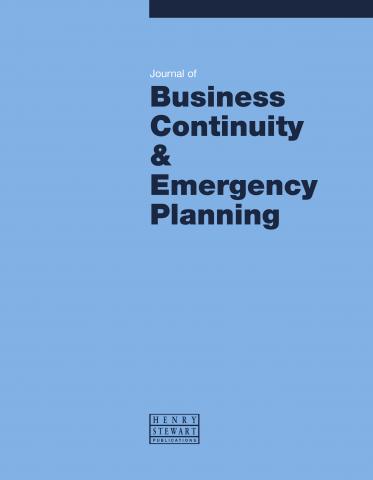"There is clear need for a quality journal of peer reviewed articles that surveyors and other property professionals can rely on to a greater standard than ordinary magazine articles or internet forums. Journal of Building Survey, Appraisal & Valuation provides that valuable information.”
Volume 1 (2006-07)
Each volume of Journal of Business Continuity & Emergency Planning consists of four quarterly 100-page issues. The articles published in Volume 1 were:
Volume 1 Number 4
-
How to access your Board/C-suite and make an effective case for business continuity investments
Chris Kite, VP, Finance and Gino Zucca, Senior Manager, Business Resiliency Group, Cisco Systems -
Developing a risk assessment programme for vendors’ BCP capabilities and their impact on your organisation
Michael Marshall, AVP, Corporate Business Continuity Planning, Wells Fargo & Co -
How a structured BIA aligned business continuity management with Gallaher Group’s strategic objectives
Stuart Selden, FM Global and Stephen Perks, Head of Group Risk Assurance, Gallaher Group -
How Toronto Pearson International Airport applied lessons from SARS to develop a pandemic response plan
Deane Johanis, Manager, Emergency Planning, Greater Toronto Airports Authority -
Bird flu: Understanding the social and cultural factors that will impede the prevention, treatment and containment of an outbreak
Michael Anastario, Research Associate, Tufts-New England Medical Center and Lynn Lawry, Director of Evidence-Based Research, International Medical Corps -
Pandemic preparedness and telecommunications resiliency: What should contingency planners be considering?
Joanne De Luca, former Global Head of Crisis Management, Barclays Capital and Roy Pinchot, CEO, TeleContinuity -
Participating in a regional public-private emergency partnership: Why do it and how do you make it work?
Brian Tishuk, Executive Director, ChicagoFIRST -
Developing an integrated civilian-military model for healthcare emergency response planning
Christopher M. Cannon, National Director, David M. Fuka, LCDR, USCG (Ret.), James L. Paturas, Deputy Director and Stewart D. Smith, CDR, USN (Ret.), Yale New Haven Center for Emergency Preparedness and Disaster Response -
Lessons learned during the 2005 Alberta floods
David Grimes, A/Assistant Deputy Minister, Meteorological Service of Canada -
Lessons in preparedness from the response to Hurricane Katrina
Brandon Bond, Disaster Preparedness Manager, Kaiser Permanente
Volume 1 Number 3
-
International planning for continuity oversight: The need for forums for financial authorities to share best practices
Alton Harvey, Chief, Office of Contingency Planning, US Securities & Exchange Commission -
Vulnerability assessments for public and private facilities
Roger L. Kemp, CEO, Town of Berlin, Connecticut -
How John Lewis Partnership connected 200 business continuity plans to an emergency notification database
Russell Husband, Former Assistant General Inspector, John Lewis Partnership -
How to build and implement a global corporate HR disaster management system
Tim Turner, HR Risk Manager, Intel -
How BT updated its business continuity strategy to improve resilience and meet Civil Contingencies Act responsibilities
Clive Ansell, Group Strategy Director, BT -
Managing the risk of ethical misconduct disasters as a business continuity strategy
Robert C. Chandler, Chair, Center for Communication & Business, Pepperdine University -
Pandemic flu planning in the US financial services sector
Annie Searle, SVP, Enterprise Risk Services, Washington Mutual -
Security certification for critical information infrastructures: The Italian certification body approach
Luisa Franchina, General Director, Laura Gratta, Head, OSCI Certification Processes and Marco Carbonelli, Head, Precertification and Accreditation Division, Ministry of Communications, Italy -
Identifying the victims of the Indian Ocean tsunami: The role of the private sector
Joseph Scanlon, Director, Emergency Communications Research Unit, Carleton University
Volume 1 Number 2
-
The tripartite approach to business continuity in the UK financial sector
Stephen P. Collins, Head of Business Continuity Division, Bank of England -
Securing a service-oriented architecture (SOA) environment
Nataraj Nagaratnam, Chief Architect, Identity Management, Anthony Nadalin, Chief Security Architect and Sridhar Muppidi, Senior Security Architect, IBM Software Group -
Developing the State of Connecticut emergency credentialing programme for healthcare professionals
Carol Luddy, Emergency Credentialing Program Coordinator; James L. Paturas, Deputy Director and Elaine Forte, CoE Program Manager, Yale New Haven Center for Emergency Preparedness and Disaster Response -
Managing travel risk: A duty of care toolkit
David Cameron, VP, Security Services (Americas), International SOS Assistance -
How VisitScotland prepared for a flu pandemic
Stephen Page and Ian Yeoman, VisitScotland -
How surviving businesses respond during and after a major disaster
Roxanne Zolin, Assistant Professor, Naval Postgraduate School and Fredric Kropp, Associate Professor, Monterey Institute of International Studies -
Developing a practical business continuity plan for the CHRISTUS Health risk management department
Randall F. Finley, System Director of Risk Management, CHRISTUS Health -
Employee crisis communication and disaster assistance planning: Providing disaster assistance to employees and their families
Melissa A. McClain, FEI Behavioral Health
Volume 1 Number 1
-
Business impact analysis: Keeping critical impact in perspective
Barry Cardoza, VP/Manager of Business Continuity, Union Bank of California -
Updating your plan after an incident: Incorporating lessons learned from the 7th July London bombings
Poli Avramidis, Director of Information Management & IT, British Medical Association -
Countering the economic effects of bird flu through teleworking
Tony Gill, Chairman, Gill Advisors -
Asset prioritisation strategy: A quantitative approach
Carlos M. Alvarado and Daniel R. Schriever, Booz Allen Hamilton -
Challenges and opportunities for business continuity within 21st-century business models
David Kaye, Chartered Insurer -
The LaSalle Bank fire: How critical operations were available next day, strategic advantage leveraged and lessons learned
Jack Smith, Business Continuity Manager for Global IT, ABN AMRO -
Why traditional business continuity thinking does not work for SMEs: A new approach for managers and their advisers
Kathleen A. Lucey, President, Montague Technology Management -
Integrating an incident command system and business continuity into a healthcare response to a flu pandemic and other infectious disease emergencies
Eric Bone, Regional Director, Office of Emergency Preparedness, Capital Health Edmonton and Area -
How to develop personalised self-care protocols for use during a crisis
Vali Hawkins Mitchell, Certified Traumatologist


